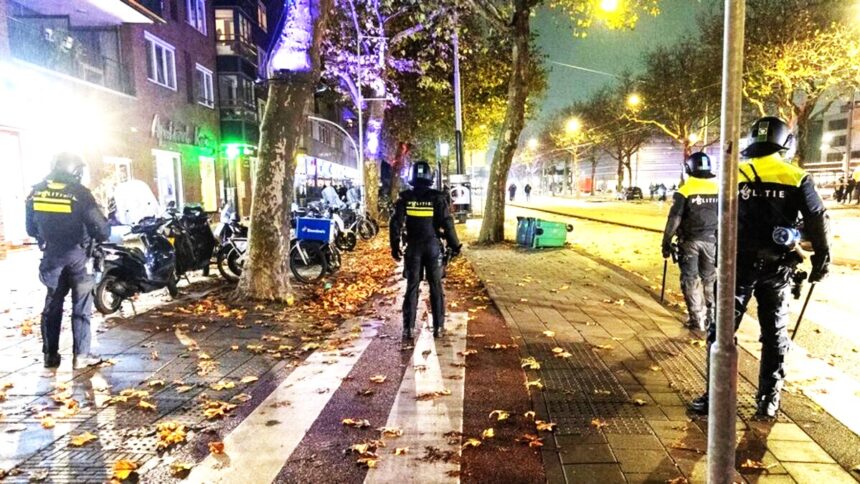Over the past several days, Amsterdam has seen a surge in violence and unrest, largely stemming from heightened tensions surrounding the Israel-Palestine conflict. What began as confrontations between Israeli soccer fans and local residents escalated into broader civil disturbances, including antisemitic attacks, public vandalism, and clashes with riot police. The unrest has left the city grappling with deepening divisions, a heavy police presence, and emergency measures aimed at restoring order.
Escalating Tensions and Violent Clashes
The latest round of violence flared up on the evening of Monday, November 11. A large group of individuals gathered in the city, leading to disturbances that included fireworks being set off inside a tram, causing a fire and shattering its windows. Video footage shared on social media showed individuals shouting antisemitic slurs, and police reported that a bus and officers were pelted with stones. Authorities quickly intervened, making three arrests and restoring order by 11 p.m. that evening.
This violence comes on the heels of even more intense clashes that occurred last week, following a soccer match between Israel’s Maccabi Tel Aviv and the Dutch team Ajax. The game itself was the center of rising tensions, with violent outbreaks both inside and outside the stadium. The altercations have now led to the detention of 62 individuals, including several Israelis, as authorities investigate incidents of antisemitic violence, arson, and other disruptive behavior.
🚨Riot police in #Amsterdam evening arrested several people during another eruption of violence sparked by a soccer match between #Israeli side Maccabi #TelAviv and local team #Ajax.
Police urged people to stay away from the square and said riot squads would remain present to… pic.twitter.com/nF9dmjtBGt
— The Bharat Current™ (@thbharatcurrent) November 12, 2024The Soccer Match: A Flashpoint for Conflict
The violence in Amsterdam began earlier in the week, culminating in the Thursday night match between Maccabi Tel Aviv and Ajax. In the lead-up to the game, tensions were already running high, with social media posts showing Maccabi fans engaging in racist and inflammatory chants. Some fans were seen praising military actions in Gaza and targeting Arabs with hateful language.
After the game, violence erupted on the streets of Amsterdam as small groups of Maccabi fans were attacked by assailants on scooters and electric bikes. These individuals would strike quickly and then disperse, making it difficult for police to respond in time. At the same time, some Maccabi supporters, fueled by their own anger, carried out acts of vandalism, including tearing down Palestinian flags and attacking a taxi. The authorities deployed over 1,200 police officers to try and maintain order during the chaotic scene, but tensions remained high, with more violent incidents later that evening.
A City Under Siege
In response to the increasing violence, Amsterdam’s city government imposed emergency measures, including a ban on public demonstrations and restrictions on face coverings, which could be used to disguise identity during protests. Jewish institutions in the city were placed under heightened security, and police forces were visibly increased on the streets. These measures, designed to curb unrest, are set to remain in place at least until Thursday.
Meanwhile, tensions have also been directed at Muslim communities, with some individuals calling for attacks on mosques and threatening violence. One man was reportedly ejected from a taxi for being Jewish, and a bomb threat was made against a local synagogue, though it later turned out to be a hoax. These disturbing events have further polarized the city, deepening divisions between different ethnic and religious groups.
The Mayor’s Call for Calm
Amsterdam’s mayor, Femke Halsema, has expressed both shock and dismay at the events, calling the violence an “outburst of antisemitism” that cannot be justified by similar acts of racism or hatred from any side. In an official report, Halsema described the situation as a “toxic cocktail” of emotions driven by both the ongoing war in Gaza and the legacy of tensions between Israeli and Palestinian supporters. She emphasized the importance of protecting all communities, noting that violence cannot be an acceptable response to hatred.
“Our city has been struck in the heart by these events,” Halsema wrote. “Amsterdammers feel pain everywhere. Violence by one is never an excuse for violence by the other.”
Rising Tensions Amid Ongoing Investigations
Despite the emergency measures, the unrest is far from over. The police continue to investigate the causes and participants of the violence, with more arrests expected in the coming days. So far, the authorities have detained 62 individuals, including 10 people with connections to Israel. While most arrests have been for minor offenses such as disturbing the peace or failing to provide identification, some suspects face more serious charges, including assault on riot police officers.
Authorities are also trying to determine whether the incidents were part of an organized campaign, as some of the violence seemed to follow a clear pattern of targeted attacks on individuals based on their ethnicity or perceived affiliation with either side of the conflict.
A Divided City Struggles to Heal
As Amsterdam struggles to deal with the fallout from the recent violence, the city’s leadership is grappling with how to bridge the deep divides that have been exposed. The violence surrounding the soccer match, combined with growing tensions from the Israel-Palestine conflict, has left many feeling unsafe. Mayor Halsema’s appeal to both UEFA and the Israeli government to remind fans that soccer is a sport, not a political battlefield, speaks to the difficulty of managing such charged emotions in an already polarized society.
The situation in Amsterdam remains fluid, with police bracing for further disturbances. As the city continues to heal, it faces the challenging task of preventing further violence while fostering understanding and unity among its diverse communities. The eyes of the world are on Amsterdam, as it seeks to navigate the complex intersection of sports, politics, and religion in an increasingly divided global landscape.
Read More : COP29 Climate Conference Kicks Off in Baku: A Global Call for Action on Climate Change






